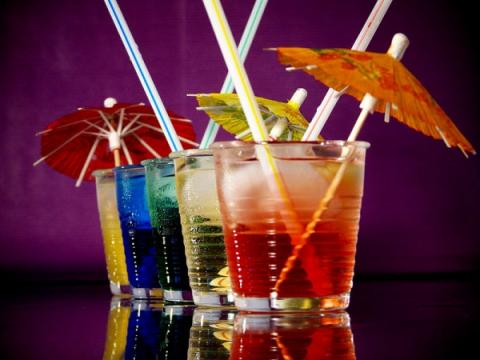
Though all the crannies of the world we filled with elves and goblins, though we dared to build gods and their houses out of dark and light, and sow the seed of dragons, 'twas our right (used or misused). The right has not decayed. We make still by the law in which we're made.
— “Mythopoeia”, J.R.R. Tolkien
I read Derek Brown’s article in Table Matters “Bartenders, Stop Making (Up) Cocktails” today with a great deal of dismay. For under a great deal of flowery language and appeals to long dead psychoanalysts was a sense of utter, terrible defeat, and a denial of one of the greatest aspects of humanity.
His first sentence makes this evident, where he claims that “[a]mong the worst instincts known to man is that of creation.” I would hesitate to ask him what he thought the best instincts were. He proceeds to indict the entire craft cocktail movement and its practitioners, passing them off as places “where you can drink new cocktails made with quirky ingredients such as dehydrated carrots, yogurt and thai chiles. “
The root cause of this defeatist attitude? Once upon a time, Mr. Brown decided to make a warm version of the Cosmopolitan, and now that he’s had an appropriate amount of time to think about it, he now realizes that “Yes, it was terrible.”
Old Fashioned
Wet sugar cube with bitters and a dash of soda or water in an old fashioned glass, muddle, add ice and whiskey, stir to dissolve thoroughly, garnish
To make the leap from one failed cocktail some time in the mid-1990’s to stating things like “Too often, bartenders, rather than sharpening our axes, studying, searching and trying to find meaning among the thousands of cocktails already created… indulge in the worst possible fantasy: that of some mixological Prometheus who steals the eternal flame of creativity from the old, stuffy Gods and re-imagines it as lavender-infused ice or cinnamon-ancho rim.”is, hopefully, hyperbole.
Once upon a time, people in this country drank whiskey. It was probably a bit rough around the edges, so an enterprising person created a new drink, one that mixed that harsh whiskey with things that would mellow it: sugar, water, and bitters. Today, this is known as an Old Fashioned, a widely revered cocktail (even by Mr. Brown). But the Old Fashioned begat the Improved (or Fancy) Cocktail, which begat the Brandy Crusta, which begat the Sidecar, which begat the Margarita, and lo, eventually led to the creation of the White Lady, the Cosmopolitan, and Mr. Brown’s warm version thereof.
Benton's Old Fashioned
Stir, strain, lowball, 1 large cube
At which point in time would Mr. Brown like to stand athwart the world and yell “Stop!”? Dividing the universe of cocktails into “approved” ones and “unapproved” ones is a false dichotomy, though Mr. Brown does evidently approve of the aforementioned Old Fashioned, the Daiquiri (invented c. 1898) and the Cosmopolitan (invented c. late 1980s, formalized, 1996). Cocktails (like all creative acts) are neither good nor bad prima facie. They simply are – a drive built into every human being. To deny the right to create is to deny art, music, and poetry a chance to exist. Denying the creative spark is to deny the stuff from which we’re made.
This is not to say that Mr. Brown doesn’t have some cogent points. It would be beneficial for aspiring bartenders to learn the classics and have a solid understanding of theory and flavors before trying to create a new drink. Or to quote the great Charlie Parker, “[m]aster your instrument, master the music, then forget all that shit and just play.”
Trinidad Sour
Shake, double strain, cocktail glass, no garnish.
There are even things to learn from a less than good cocktail. Making a drink is rarely perfect the first time, but can lead to a better understanding of how ingredients work together. Attitudes toward inventive uses for already available products change, like using Angostura Bitters in place of whiskey in a Sour (thank you Guiseppe Gonzalez of Clover Club) to make the Trinidad Sour (2009).
The longing to slow down the pace of change in the face of it is great. But yearning to deny creativity and craft out of fear of change is not only short-sighted, but impoverishes the world of much that may, some day, be beautiful.
by Zachary Pearson, editor
I'm never sure with that guy. Thanks, Zachary

It looks like they pulled the article but based on your quotes I would imagine this was at most half serious.